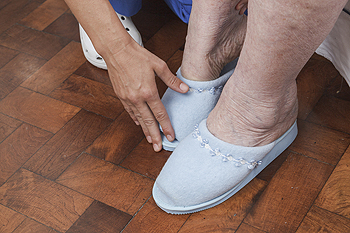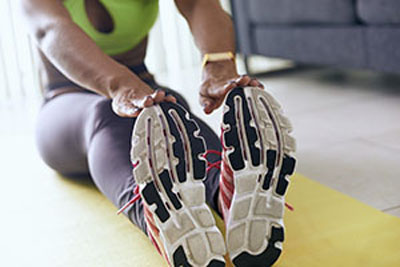Flint Office
1303 S. Linden Rd., Suite D
Flint, MI 48532
Many parents buy the first pair of shoes prematurely for their children. It is not necessary for children to wear shoes until they begin walking. It is said that while babies are crawling, soft socks with non-skid soles are more important than shoes. As they learn to walk, allow them to walk barefoot while indoors as this is beneficial in strengthening the toes. When shoes are purchased, it helps to choose a pair that are flexible, have a softer sole, and have adequate room for the toes to move freely in. This will help prevent stubbed toes and ingrown toenails, which can cause severe pain and discomfort. If you would like more information about what type of first shoes your child should wear, it is suggested that you consult with a podiatrist.
The health of a child’s feet is vital to their overall well-being. If you have any questions regarding foot health, contact one of our podiatrists of Community Podiatry Group. Our doctors can provide the care you need to keep you pain-free and on your feet.
Tips for Keeping Children's Feet Healthy
If you have any questions, please feel free to contact our office located in Flint, MI . We offer the newest diagnostic and treatment technologies for all your foot care needs.
 The Achilles tendon is located on the back of the ankle and connects the heel to the calf muscles. The two most common injuries that affect the Achilles tendon are Achilles tendinopathy and an Achilles tendon tear or rupture. Achilles tendinopathy symptoms include swelling, stiffness, and pain that is more noticeable in the morning. An Achilles tendon tear or rupture is often the result of forceful jumping and pivoting and sudden accelerations that result in overstretching and the eventual tearing of the tendon. A complete rupture can cause severe pain and a loss of strength and movement. Because of the seriousness of an Achilles tendon injury, patients who are experiencing pain and swelling in this tendon should consult with a podiatrist. A podiatrist will be able to help provide preventative measures to avoid a rupture, as well as guide you in healing the injury.
The Achilles tendon is located on the back of the ankle and connects the heel to the calf muscles. The two most common injuries that affect the Achilles tendon are Achilles tendinopathy and an Achilles tendon tear or rupture. Achilles tendinopathy symptoms include swelling, stiffness, and pain that is more noticeable in the morning. An Achilles tendon tear or rupture is often the result of forceful jumping and pivoting and sudden accelerations that result in overstretching and the eventual tearing of the tendon. A complete rupture can cause severe pain and a loss of strength and movement. Because of the seriousness of an Achilles tendon injury, patients who are experiencing pain and swelling in this tendon should consult with a podiatrist. A podiatrist will be able to help provide preventative measures to avoid a rupture, as well as guide you in healing the injury.
Achilles tendon injuries need immediate attention to avoid future complications. If you have any concerns, contact one of our podiatrists of Community Podiatry Group. Our doctors can provide the care you need to keep you pain-free and on your feet.
What Is the Achilles Tendon?
The Achilles tendon is a tendon that connects the lower leg muscles and calf to the heel of the foot. It is the strongest tendon in the human body and is essential for making movement possible. Because this tendon is such an integral part of the body, any injuries to it can create immense difficulties and should immediately be presented to a doctor.
What Are the Symptoms of an Achilles Tendon Injury?
There are various types of injuries that can affect the Achilles tendon. The two most common injuries are Achilles tendinitis and ruptures of the tendon.
Achilles Tendinitis Symptoms
Rupture Symptoms
Treatment and Prevention
Achilles tendon injuries are diagnosed by a thorough physical evaluation, which can include an MRI. Treatment involves rest, physical therapy, and in some cases, surgery. However, various preventative measures can be taken to avoid these injuries, such as:
If you have any questions please feel free to contact our office located in Flint, MI . We offer the newest diagnostic tools and technology to treat your foot and ankle needs.
 Keeping your body as strong as possible as you age goes a long way in helping you to maintain proper balance and reducing the risk of falling or adding undue stress on certain parts of your body. A podiatrist can do a physical examination of you and also conduct a gait analysis—which assesses the mechanics of how you walk and detects any irregularities which may negatively affect your balance and stride. Certain exercises, or specific treatments and therapies to correct gait abnormalities may be part of your wellness plan. With the help of a podiatrist, you can take the right steps in improving balance and strengthening muscles in the feet and legs to help you stay independent and mobile for as long as possible.
Keeping your body as strong as possible as you age goes a long way in helping you to maintain proper balance and reducing the risk of falling or adding undue stress on certain parts of your body. A podiatrist can do a physical examination of you and also conduct a gait analysis—which assesses the mechanics of how you walk and detects any irregularities which may negatively affect your balance and stride. Certain exercises, or specific treatments and therapies to correct gait abnormalities may be part of your wellness plan. With the help of a podiatrist, you can take the right steps in improving balance and strengthening muscles in the feet and legs to help you stay independent and mobile for as long as possible.
If you need your feet checked, contact one of our podiatrists of Community Podiatry Group. Our doctors will attend to all of your foot and ankle needs and provide you with quality treatment.
Geriatrics and Podiatry
When people age, some common issues that may occur are bone density loss, dry skin, poor circulation, and rough brittle nails. These issues may also affect your foot health if the necessary steps are not taken to alleviate the problems.
It is important to take care of your feet because feet that are injured or diseased can affect your overall health. Having painful feet hinders your ability to do daily activities or may decrease your willingness to do the things that you need to do.
Visiting Your Geriatrician
As we age, health problems become more likely, so it is essential to visit your doctor for check-ups to ensure that you are doing the best you can to take care of your health. It is recommended to check your feet frequently for any possible cuts, bruises, swelling, corns or any other irregularities.
Taking Care of Elderly Feet
Cracked or dry feet can be treated by applying moisturizer often. It is also important not to wear old socks because the older the sock is, the higher the possibility there will be that there is bacteria there. Wear fresh socks and make sure they fit properly.
Proper foot health means that you can have a more active lifestyle and you will not be bogged down by pain. Foot health also leads to good circulation, which is paramount for overall health.
If you have any questions, please feel free to contact our office located in Flint, MI . We offer the newest diagnostic tools and technology to treat your foot and ankle needs.
Cracked  heels are a common foot problem that can affect up to one in five adults. While cracked heels aren’t usually a big issue for most, they can lead to discomfort and severe pain. There are a variety of factors that can lead to cracked heels. These include standing for long periods of time, walking barefoot, using harsh soaps, dry skin from the climate, and shoes that don’t support the heels. Medical causes such as a vitamin deficiency, fungal infection, obesity, or pregnancy can also lead to cracked heels. In order to prevent cracked heels, make sure to wear shoes that properly support the heels by avoiding shoes with an open back, tall skinny heel, or shoes that are too tight. Staying hydrated, using a foot cream, avoiding standing in one place for a long period of time, and using custom shoe inserts are all ways to help prevent and treat cracked heels. If you have painful cracked heels, consulting with a podiatrist is suggested for a proper treatment method.
heels are a common foot problem that can affect up to one in five adults. While cracked heels aren’t usually a big issue for most, they can lead to discomfort and severe pain. There are a variety of factors that can lead to cracked heels. These include standing for long periods of time, walking barefoot, using harsh soaps, dry skin from the climate, and shoes that don’t support the heels. Medical causes such as a vitamin deficiency, fungal infection, obesity, or pregnancy can also lead to cracked heels. In order to prevent cracked heels, make sure to wear shoes that properly support the heels by avoiding shoes with an open back, tall skinny heel, or shoes that are too tight. Staying hydrated, using a foot cream, avoiding standing in one place for a long period of time, and using custom shoe inserts are all ways to help prevent and treat cracked heels. If you have painful cracked heels, consulting with a podiatrist is suggested for a proper treatment method.
If the skin on your feet starts to crack, you may want to see a podiatrist to find treatment. If you have any concerns, contact one of our podiatrists from Community Podiatry Group. Our doctors can provide the care you need to keep you pain-free and on your feet.
Cracked Heels
It is important to moisturize your cracked heels in order to prevent pain, bleeding, and infection. The reason cracked heels form is because the skin on the foot is too dry to support the immense pressure placed on them. When the foot expands, the dry skin on the foot begins to split.
Ways to Help Heal Them
Ways to Prevent Cracked Heels
If you are unsure how to proceed in treating cracked heels, seek guidance from a podiatrist. Your doctor will help you with any questions or information you may need.
If you have any questions, please feel free to contact our office located in Flint, MI . We offer the newest diagnostic and treatment technologies for all your foot care needs.